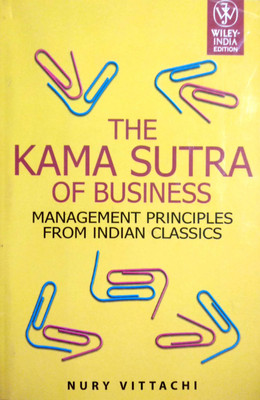Kama Sutra of Business,the:Management Principles from Indian Classics 01 Edition(English, Paperback, Vittachi Nury)
Quick Overview
Product Price Comparison
The Kama Sutra of Business is based on Indian history and the country's classic literature. It draws lessons for business and life from the remarkable stories of leaders and the ancient texts with which they are associated, including The Bhagavad-Gita and The Kama Sutra. The chapters lightly (but not frivolously) bring out management lessons from the stories. Most valuably, the book gives introduces Kautilya Chanakya, the world's first management guru, to the world-wide business community. About The Author At Nury Vittachi's birth, civil war broke out. "The two incidents were not connected. At least, I don"t think so," he said. When he was a toddler, gunmen threatened the family, so they fled to the airport and bought tickets out of their homeland (then called Ceylon) on the first flight to anywhere. After several nomadic years, Vittachi settled in Hong Kong, where his way with words and nose for news made him famous for columns such as "Lai See" in the South China Morning Post and "Travellers" Tales" in the Far Eastern Economic Review. He wrote a book which sold out in 10 days and had to be reprinted six times. So he became an author, and wrote several books which were picked up by major publishers around the world. He is best known for his comedy crime novel series. The Feng Shui Detective. Vittachi has become a spokesman for authors in Asia, having been instrumental in starting Asia's biggest writers" conference, the Hong Kong International Literary Festival, a quarterly journal called the Asia Literary Review, and the Man Asia Literary Prize, a spin-off from the Man Booker Prize. He can be contacted through the website at www.thewritersvillage.com. Table Of Contents Modern Treasures From Ancient Sources Secrets of The Kama Sutra, The Bhagavad-Gita and other Indian writings, and how they apply to modern business The Planet's First Business Guru Was a Guru Kautilya Chanakya wrote a classic management book 23 centuries ago-and the lessons of his life and his work still resonate powerfully today The Man Who Gave Away the World Chandragupta Maurya created one of the biggest empires in the world-and then gave it away to become a beggar. His extraordinary tale is an object lesson in building an organization and identifying what you really want in life The Lost Cities Under a mound in Pakistan, archeologists of the 1920s found a ŌĆ£lost worldŌĆØ: a group of planned cities older than any other on earth. Five millennia ago, planners discovered that concentrated activity generates wealth The Moment Before Death Minutes before a battle, four thousand years ago, a soldier confronted the great questions of life and death; if someone wins, do others have to lose? The Bhagavad-Gita delivers unforgettable lessons on absolute values to use in business and in our personal lives The Disappearing Ones When the slightest illness struck anyone in the household of young Siddharta, they disappeared. Attempts to protect the young prince from the truth about illness and death backfired, but leave us with valuable lessons on avoiding protectionism, materialism and other traps The Slaughterer's Song Ruthless Asoka was the first man to unite India. But when he lowered his blood-drenched sword and turned to peace, he made an even greater impact on the world. His story teaches us to develop our capacity for achievement and make key decisions The Ultimate Motivator The Kama Sutra is famed for its wisdom on sexual intercourse: but that's only a tiny part of the book. The untapped majority of the work teaches us to understand the nature of desire as the key human motivator-and how to use it as a tool Further Travels in Ancient Writings Inner journeys can take you a long way. This chapter looks at other Indian classics, including the Rig Veda, and identifies sources of ancient wisdom that retains their value today


